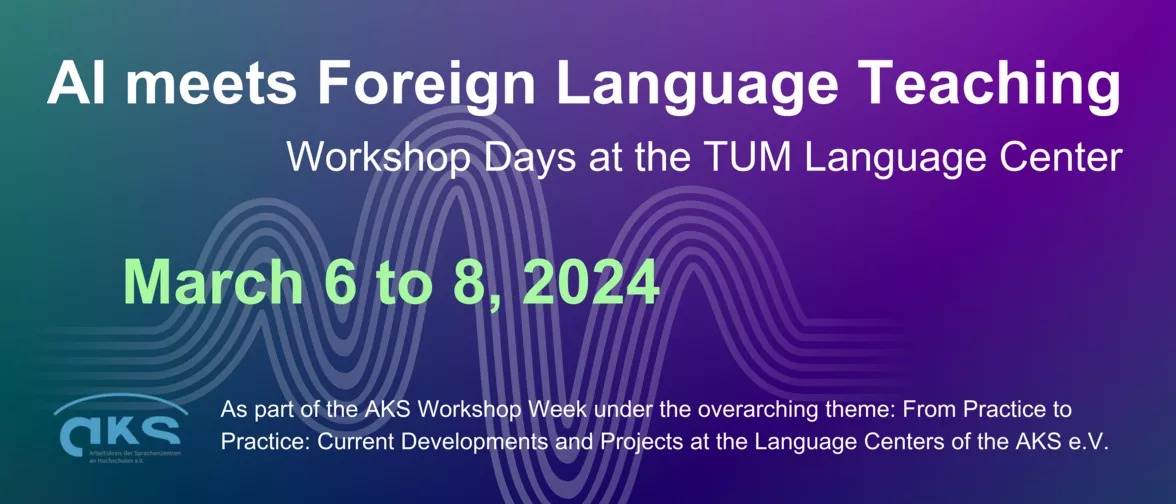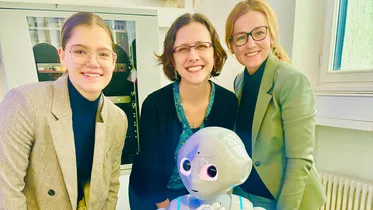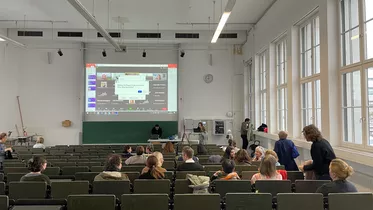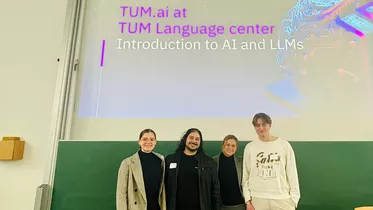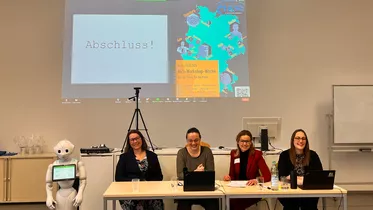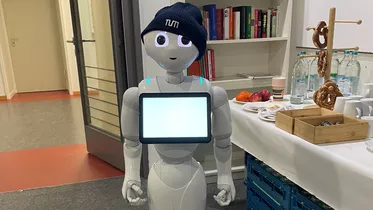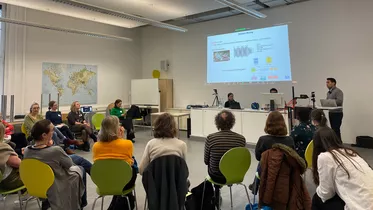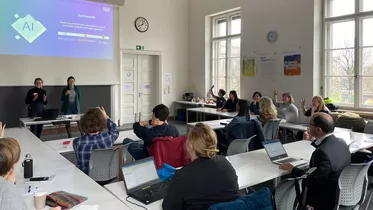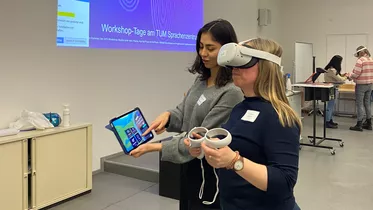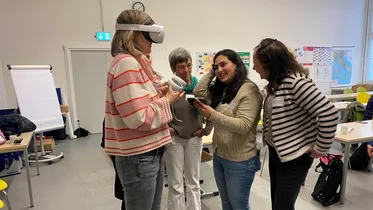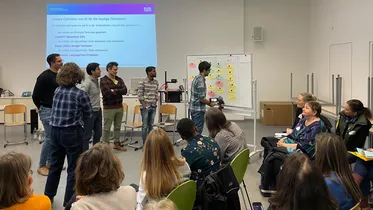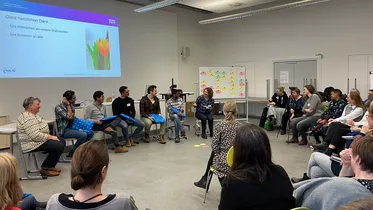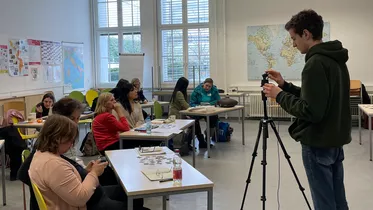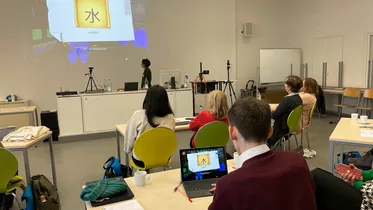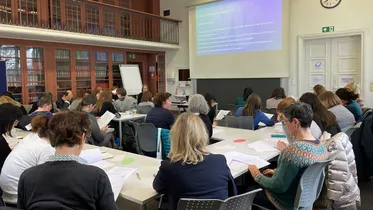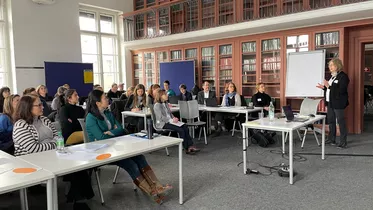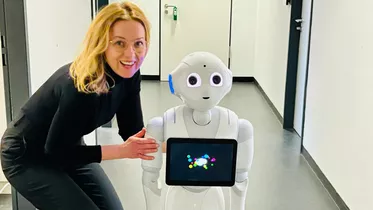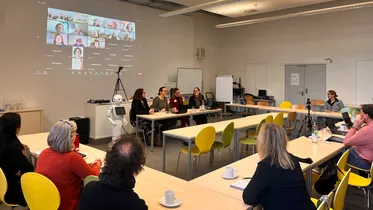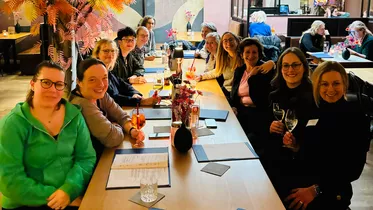Workshop Days at the TUM Language Center
AI in action-oriented language teaching: practical applications and strategies
From March 6 to 8, 2024 workshops on the topic “AI meets Foreign Language Teaching” took place at the TUM Language Center.
On this page you can find recordings and presentation slides as well as photos of the event.
Collection of links
On this page, you will find a collection of links and materials related to the topic “AI meets foreign language teaching”:
Collecion of links - AI meets foreign language teaching
If you would like to contribute or add something, please feel free to email us at sprachenzentrum(at)tum.de.
AKS-internal platform
The event took place as part of a workshop week run by the AKS (AKS=Working Group of Language Centers, a network for institutions and people who are active in the areas of language practical and language didactic training, advanced training and research).
The platform is used for communication between AKS members. In addition to discussion forums, it also contains file repositories and archives; the platform is also used to organize online events. Employees of AKS member institutions can create their own account with their institute e-mail address.
The AKS-Intern platform you will find the follow-up material like presentations or recordings of the AKS workshop week events.
Follow-up material for the workshops at the TUM Language Center can be found below.
Auftaktveranstaltung der 1. AKS-Workshop-Woche “Aus der Praxis für die Praxis: Aktuelle Entwicklungen und Projekte an den Sprachenzentren des AKS e.V”
Referentin:
Prof. Dr. habil. Ines Busch-Lauer
Inhalt:
Wie viele Bereiche wurde auch die Fremdsprachenlehre und das Sprachenlernen in den letzten Jahren stark durch innovative Technologien beeinflusst. Lernplattformen, Videokonferenzsysteme, Apps, Selbstlernprogramme, virtuelle Tutor:innen, Chatbots und schließlich auch KI-Assistenzen bieten eine Vielfalt an Möglichkeiten, Sprachen zu lehren, zu lernen und anzuwenden. Gleichzeitig stellen Migration, Fachkräftemangel und Mehrsprachigkeit erweiterte Herausforderungen für die Fremdsprachenvermittlung dar. Zeit, ein Zwischenfazit zu ziehen, den erreichten Stand zu beleuchten, Aufgabenfelder und Potentiale zu erkennen und Perspektiven zu diskutieren. Der Vortrag unternimmt den Versuch, in Form eines Rückblicks auf veränderte Lehr-Lern-Szenarien seit der Coronapandemie einzugehen, durch Praxisbeispiele Einblick in die aktuellen Herausforderungen der Fachsprachenvermittlung zu geben und mit Blick auf die Zukunft des Fremdsprachenlernens einige Impulse für die Diskussion im Rahmen der Veranstaltungen der Workshopwoche des AKS e.V. zu geben.
Im Mittelpunkt der Vortrags stehen die Effekte der Virtualisierung von Lehre, die Rolle digitaler Tools und Künstlicher Intelligenz (KI) und das Potential von Mehrsprachigkeit in der Gesellschaft – Faktoren, die eine neue Qualität des Lehrens und Lernens eröffnen. Einige KI-Anwendungsfelder in der Fremdsprachenvermittlung werden aufgezeigt und mögliche Konsequenzen für die am Lernprozess Beteiligten aus institutioneller und individueller Sicht angesprochen. Da die Nutzung von KI in verschiedenen Bereichen zwischen Experimentierlust, Euphorie, Zweifel und Kritik schwankt, ergeben sich u.a. folgende Fragen für die Diskussion: Wie gestalten wir in Anbetracht der rasanten Veränderungen unsere Lehr- und Prüfungsformate? Wie werden wir den neuen Anforderungen durch/ mit KI beim Fremdsprachenlernen gerecht? Ist KI tatsächlich ein/ der Game Changer? Welche Konsequenzen sind durch die Wechselwirkung von menschlicher und künstlicher Intelligenz in der praktischen Sprachverwendung im Alltag und in fachlicher Interaktion zu erwarten?
Kurzinformationen Busch-Lauer
Ines-A. Busch-Lauer ist seit 2006 Professorin für Fachenglisch/ Kommunikation an der Westsächsischen Hochschule Zwickau, leitet die Fachgruppe Fachbezogene Sprachausbildung und verantwortet die Englischausbildung für technisch-ingenieurwissenschaftliche Studiengänge und die studienbegleitende DaF-Ausbildung für internationale Studierende. Sie studierte Anglistik, Russistik, Psychologie und Pädagogik an der Universität Leipzig, promovierte 1986 im Bereich Kontrastive Fachtextlinguistik und habilitierte im Jahr 2000 mit einer kontrastiven Arbeit zu Fachtextsorten in Medizin und Linguistik. Sie verfügt über langjährige Forschungs- und Lehrerfahrungen, die sie u.a. am Sprachenzentrum und am Herder-Institut der Universität Leipzig, der Hochschule Magdeburg-Stendal und der TU Dresden sowie als Sprachdozentin und Fachübersetzerin in der Software-Industrie erwerben konnte. Ihre Arbeitsschwerpunkte sind Angewandte Linguistik, Fachkommunikation und Fachsprachendidaktik. Sie ist Herausgeberin der Reihe Fach, Sprache und Kultur beim Verlag Frank & Timme, Ko-Herausgeberin der Zeitschrift Fachsprache. Journal of Professional and Scientific Communication und Mitglied in Fachorganisationen, u.a. auch der Ständigen Kommission des AKS.
Follow-up:
Link zum Padlet
The recording is available via AKS intern: aks-intern.de/course/view.php;
Speakers:
Leah Sharp, Team Educational Technology, ProLehre | Media and didactics at the TUM Institute for LifeLong Learning
Christina Thunstedt, Senior Lecturer/Deputy Head, TUM Language Center
Contents:
Join us for an insightful session as we explore the collaborative efforts of ProLehre and the Language Center at TUM, where we bridge pedagogy and technology in language education. Discover how our tutor training program empowers them to enhance language learning through innovative technological developments, offering a best-practice example from TUM that can inspire educators and language center heads alike.
Follow-up:
Presentation slides: https://kurzelinks.de/KI-meets-Fremdsprachenlehre
Wednesday, March 6, 2024, 10:00-11:30 a.m
Language(s): English
Format: Presence
Room: 1180
Speakers:
Mustafa ElHayani, TUM student, Master Computer Science
Sophia Ludewig, TUM student, Bachelor Information Systems
Johannes Michalke, TUM student, Bachelor of Computer Science
Laurenz Sommerlad, TUM student, Bachelor Information Systems
Contents:
What exactly are AI and LLMs? This workshop aims to give an overview about the technical aspects of AI. Additionally, we will examine the functionality of different translators and draw comparisons between them.
Follow-up:
Presentation slides: PDF
Speaker:
Hao Zhou, Department Coordinator for Chinese, TUM Language Center
Contents:
Presentation of alternatives to ChatGPT (such as Memrise) as a learning partner for small exam tasks (A1 and A2).
Follow-up:
Presentation slides: PDF
Speakers:
Valeska Hagner, German lecturer, TUM Language Center
Karl Hughes, English lecturer, TUM Language Center
Rose Jacobs, English lecturer, TUM Language Center
Christine Reulein, German lecturer, TUM Language Center
Stephen Starck, English lecturer, TUM Language Center
Contents:
In our courses and also in writing advice, we see how AI is used when writing texts at levels A2 to C2. In this workshop we would like to share our thoughts and experiences with it. As a team, we give one or two PowerPoint presentations, make our slides available and moderate group work with discussion. Each group will then briefly present their ideas to the group. We will collect these on slides and share them with all participants.
Follow-up:
Presentation slides: PDF
Speakers:
Heide Stiebeler, lecturer for German, TUM Language Center
Dominik Selent, lecturer for German, TUM Language Center
Contents:
The starting point for our workshop is a small study in B2, in which the students first created a text without any aids and then with the help of ChatGPT. What language work options are available here? And how can we motivate students to continue working on the results of the chatbot independently and confidently? We want to examine these and other questions in more detail in our workshop and also go directly into planning short teaching sequences. At the end, the participants should be able to take away concrete ideas on how ChatGPT & Co can be established as “reliable” learning partners in the classroom.
Follow-up:
Presentation slides: PDF
Programm
Arbeitsaufträge
Reflexionsaufgabe
Speakers:
Victoria Guerrero Madrid, Spanish lecturer, TUM Language Center
Isabel Hoffmann, doctoral student and project assistant at the Institute for German as a Foreign Language at the LMU
Contents:
Presentation of a survey by students about their first experiences with VR glasses using the Immerse platform in Spanish lessons. We test the technology together using a few simple exercises from the Spanish A1 level.
Speaker:
Ross Clark, English lecturer, TUM Language Center
Contents:
How can we leverage AI to encourage and guide learner autonomy in areas such as extensive reading, extensive listening, and binge-watching to help learners create their own, custom-fit contexts of language immersion?
Follow-up:
Presentation slides: PDF
Speakers:
Leah Sharp, Team Educational Technology, ProLehre | Media and didactics at the TUM Institute for LifeLong Learning
Ben Lenk-Ostendorf, Team Educational Technology, ProLehre | Media and didactics at the TUM Institute for LifeLong Learning
Contents:
To learn a foreign language using ChatGPT, one can engage in text-based conversations for practice, build vocabulary, get help with grammar, understand pronunciation through phonetic transcriptions, practice translation, gain cultural insights, work on reading comprehension, receive writing assistance, and Enjoy customized learning content tailored to your specific interests or goals. Regular interaction and various exercises with ChatGPT can significantly enhance foreign language skills.
In this hands-on workshop, we will explore some of the many possibilities that ChatGPT can offer by providing participants with the opportunity to actively engage with ChatGPT, allowing them to experience firsthand the innovative ways ChatGPT can be utilized in real-world language teaching scenarios .
Follow-up:
Presentation slides: PDF
Recording: https://syncandshare.lrz.de/getlink/fi6qXvNYTGCATQhxJQfcsh/video1067281715.mp4
Website: HP5 Material - DidaktiKI Bayern - BayernCollab (dvb.bayern)
Speaker:
David Stiftl, TUM Student, Bachelor Informatik
Min Shan Luong, TUM Student, Master Games Engineering
Marie Miyayama, Bereichskoordinatorin für Japanisch, TUM Sprachenzentrum
Contents:
The professorship for Augmented Reality at TUM researches the application of Augmented Reality (AR) technology in real-life scenarios. Dr. David Plecher focuses his research specifically on Serious (AR) Games, which are video games with an educational aspect, aimed at conveying historical, archaeological, and linguistic learning content.
Under his supervision, the Serious Game "Dragon Tale" was developed, which aims to support Japanese learners in learning Kanji characters. The TUM students who are currently working on this project present it and exchange ideas with the workshop participants about future possibilities.
Follow-up:
Presentation slides: PDF
Speakers:
Hao Zhou, Department Coordinator for Chinese, TUM Language Center
Christina Thunstedt, Senior Lecturer/Deputy Head, TUM Language Center
Contents:
Collective tasks with a scientific and economic relevance and with the use of ChatGPT in the B level in the areas of Chinese and Swedish:
- How did the fast food chain KFC implement its localization?
- On the hunt for the northern lights
After presenting these two practical examples, we will begin an exchange - with joint development of ideas for the use of AI in the B level for MINT students.
Follow-up:
Presentation slides: PDF
Speakers:
Prof. Dr. Seyed Jalal Etesami, Decision Analytics, TUM School of Computation, Information and Technology
Elisabeth Thiessen, lecturer for German, TUM Language Center
Contents:
Insights into AI research at TUM: current projects, interaction between humans and machines in programming and application; Limits of science, future scenarios; subsequent question and answer session; Lecturer: TUM Professor (Department of Computer Science) – also possible with the participation of a computer science student with a focus on AI.
Follow-up:
Presentation slides: PDF PDF
Recording: https://tum.cloud.panopto.eu/Panopto/Pages/Viewer.aspx?id=50bd013b-2782-4f40-9ac0-b13f00b9adf5
Speakers:
Heide Stiebeler, German lecturer and Head of AG Lernerfolg, TUM Language Center with the members
María Jesús García, Head of Spanish Program, TUM Language Center
Kristina Gauß, Coordinator of Russian Program, TUM Language Center
Anne Schlömer, German Lecturer, TUM Language Center
Madeleine Stapel, English Lecturer, TUM Language Center
Tania Tapia Pérez, Spanish Lecturer, TUM Language Center
Christina Thunstedt, Head Lecturer/Vice Director and Head of Swedish Program, TUM Language Center
Rosane Werkhausen, Coordinator of Portuguese Program, German Lecturer, TUM Language Center
Hao Zhou, Coordinator of Chinese Program, TUM Language Center
Contents:
The cross-departmental “AG Learning Success” at the TUM Language Center deals with all questions relating to performance measurement and teaching learning success. In our workshop we would first like to present a few current discussion points regarding the assessment of examination performance in the context of AI. These points should then provide an introduction to an intensive exchange, in which other questions relating to the topic of testing are also welcome.
Ultimately, the aim of our event should be to get to know very specific solutions in addition to specific questions or to work them out in small groups.
Speakers:
Dorothea Hartkopf, lecturer for German, TUM Language Center
Christine Reulein, lecturer for German, TUM Language Center
Contents:
Record statements from the people involved, identify different goals of the two groups, find solutions to conflicting goals.
Follow-up:
Presentation slides: PDF
Speakers:
Dr. Maike Engelhardt, Chairwoman of AKS e. v.
Dr. Michael Märlein, deputy chairman of AKS e. v.
Cristina Schalk, clearing house AKS e. v.
Christina Thunstedt, Senior Lecturer/Deputy Head, TUM Language Center
Esther Stärcke, Coordinator of resources and programs, TUM Language Center
Contents:
The moderated discussion between the board, the clearing house and the language center of the TU Munich takes questions and suggestions from AKS members and workshop week participants, and provides information on current activities of the AKS, working methods that often remain hidden, and plans for the near future. Where is the AKS going, what paths are open to it and how can the members shape the association?
An open and hybrid question format in which Dr. Maike Engelhardt (Chairwoman), Dr. Michael Märlein (deputy chairman), Cristina Schalk (clearing house) in conversation with Christina Thunstedt (TUM) answer members' questions asked in advance and in the chat during the round and present their activities in the AKS.
Contact
Please note E-mail-etiquette
and use your TUM-E-mail-address,
so we can better spot your E-mails.
